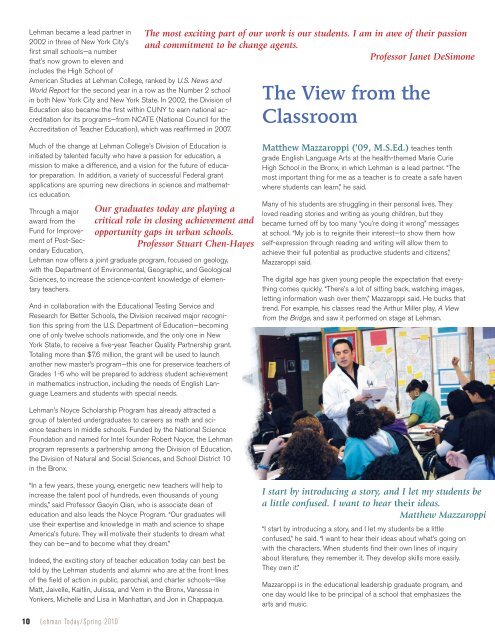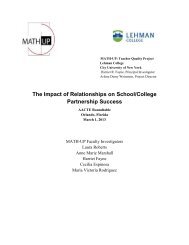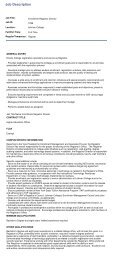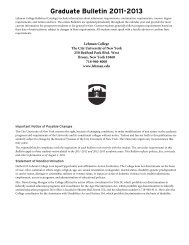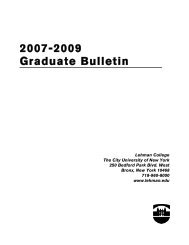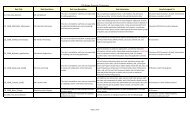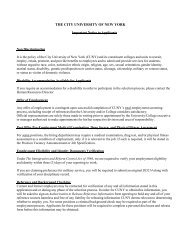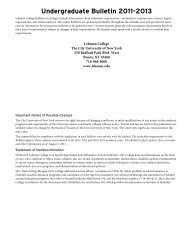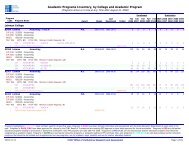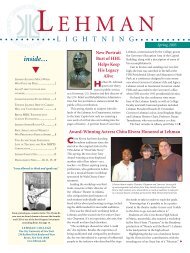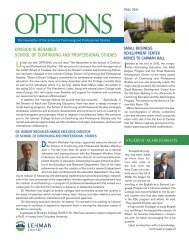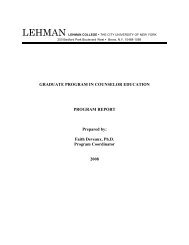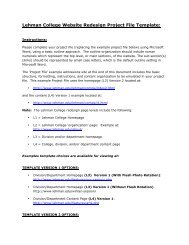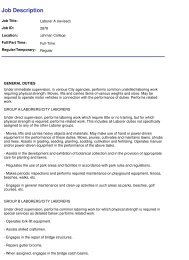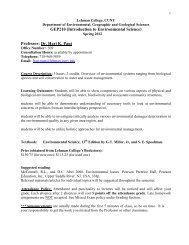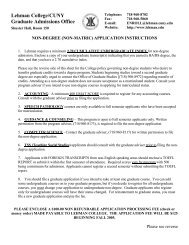Entering a New Era of Multimedia - Lehman College
Entering a New Era of Multimedia - Lehman College
Entering a New Era of Multimedia - Lehman College
You also want an ePaper? Increase the reach of your titles
YUMPU automatically turns print PDFs into web optimized ePapers that Google loves.
<strong>Lehman</strong> became a lead partner in<br />
2002 in three <strong>of</strong> <strong>New</strong> York City’s<br />
first small schools—a number<br />
that’s now grown to eleven and<br />
includes the High School <strong>of</strong><br />
American Studies at <strong>Lehman</strong> <strong>College</strong>, ranked by U.S. <strong>New</strong>s and<br />
World Report for the second year in a row as the Number 2 school<br />
in both <strong>New</strong> York City and <strong>New</strong> York State. In 2002, the Division <strong>of</strong><br />
Education also became the first within CUNY to earn national accreditation<br />
for its programs—from NCATE (National Council for the<br />
Accreditation <strong>of</strong> Teacher Education), which was reaffirmed in 2007.<br />
Much <strong>of</strong> the change at <strong>Lehman</strong> <strong>College</strong>’s Division <strong>of</strong> Education is<br />
initiated by talented faculty who have a passion for education, a<br />
mission to make a difference, and a vision for the future <strong>of</strong> educator<br />
preparation. In addition, a variety <strong>of</strong> successful Federal grant<br />
applications are spurring new directions in science and mathematics<br />
education.<br />
Through a major<br />
award from the<br />
Fund for Improvement<br />
<strong>of</strong> Post-Secondary<br />
Education,<br />
<strong>Lehman</strong> now <strong>of</strong>fers a joint graduate program, focused on geology,<br />
with the Department <strong>of</strong> Environmental, Geographic, and Geological<br />
Sciences, to increase the science-content knowledge <strong>of</strong> elementary<br />
teachers.<br />
And in collaboration with the Educational Testing Service and<br />
Research for Better Schools, the Division received major recognition<br />
this spring from the U.S. Department <strong>of</strong> Education—becoming<br />
one <strong>of</strong> only twelve schools nationwide, and the only one in <strong>New</strong><br />
York State, to receive a five-year Teacher Quality Partnership grant.<br />
Totaling more than $7.6 million, the grant will be used to launch<br />
another new master’s program—this one for preservice teachers <strong>of</strong><br />
Grades 1-6 who will be prepared to address student achievement<br />
in mathematics instruction, including the needs <strong>of</strong> English Language<br />
Learners and students with special needs.<br />
<strong>Lehman</strong>’s Noyce Scholarship Program has already attracted a<br />
group <strong>of</strong> talented undergraduates to careers as math and science<br />
teachers in middle schools. Funded by the National Science<br />
Foundation and named for Intel founder Robert Noyce, the <strong>Lehman</strong><br />
program represents a partnership among the Division <strong>of</strong> Education,<br />
the Division <strong>of</strong> Natural and Social Sciences, and School District 10<br />
in the Bronx.<br />
“In a few years, these young, energetic new teachers will help to<br />
increase the talent pool <strong>of</strong> hundreds, even thousands <strong>of</strong> young<br />
minds,” said Pr<strong>of</strong>essor Gaoyin Qian, who is associate dean <strong>of</strong><br />
education and also leads the Noyce Program. “Our graduates will<br />
use their expertise and knowledge in math and science to shape<br />
America’s future. They will motivate their students to dream what<br />
they can be—and to become what they dream.”<br />
Indeed, the exciting story <strong>of</strong> teacher education today can best be<br />
told by the <strong>Lehman</strong> students and alumni who are at the front lines<br />
<strong>of</strong> the field <strong>of</strong> action in public, parochial, and charter schools—like<br />
Matt, Jaivelle, Kaitlin, Julissa, and Vern in the Bronx, Vanessa in<br />
Yonkers, Michelle and Lisa in Manhattan, and Jon in Chappaqua.<br />
10 <strong>Lehman</strong> Today/Spring 2010<br />
The most exciting part <strong>of</strong> our work is our students. I am in awe <strong>of</strong> their passion<br />
and commitment to be change agents.<br />
Pr<strong>of</strong>essor Janet DeSimone<br />
Our graduates today are playing a<br />
critical role in closing achievement and<br />
opportunity gaps in urban schools.<br />
Pr<strong>of</strong>essor Stuart Chen-Hayes<br />
The View from the<br />
Classroom<br />
Matthew Mazzaroppi (‘09, M.S.Ed.) teaches tenth<br />
grade English Language Arts at the health-themed Marie Curie<br />
High School in the Bronx, in which <strong>Lehman</strong> is a lead partner. “The<br />
most important thing for me as a teacher is to create a safe haven<br />
where students can learn,” he said.<br />
Many <strong>of</strong> his students are struggling in their personal lives. They<br />
loved reading stories and writing as young children, but they<br />
became turned <strong>of</strong>f by too many “you’re doing it wrong” messages<br />
at school. “My job is to reignite their interest—to show them how<br />
self-expression through reading and writing will allow them to<br />
achieve their full potential as productive students and citizens,”<br />
Mazzaroppi said.<br />
The digital age has given young people the expectation that everything<br />
comes quickly. “There’s a lot <strong>of</strong> sitting back, watching images,<br />
letting information wash over them,” Mazzaroppi said. He bucks that<br />
trend. For example, his classes read the Arthur Miller play, A View<br />
from the Bridge, and saw it performed on stage at <strong>Lehman</strong>.<br />
I start by introducing a story, and I let my students be<br />
a little confused. I want to hear their ideas.<br />
Matthew Mazzaroppi<br />
“I start by introducing a story, and I let my students be a little<br />
confused,” he said. “I want to hear their ideas about what’s going on<br />
with the characters. When students find their own lines <strong>of</strong> inquiry<br />
about literature, they remember it. They develop skills more easily.<br />
They own it.”<br />
Mazzaroppi is in the educational leadership graduate program, and<br />
one day would like to be principal <strong>of</strong> a school that emphasizes the<br />
arts and music.


